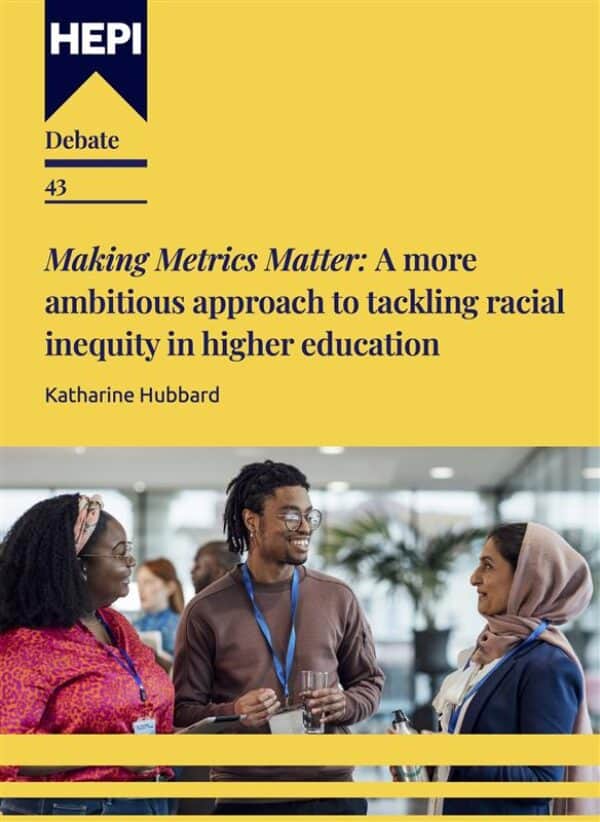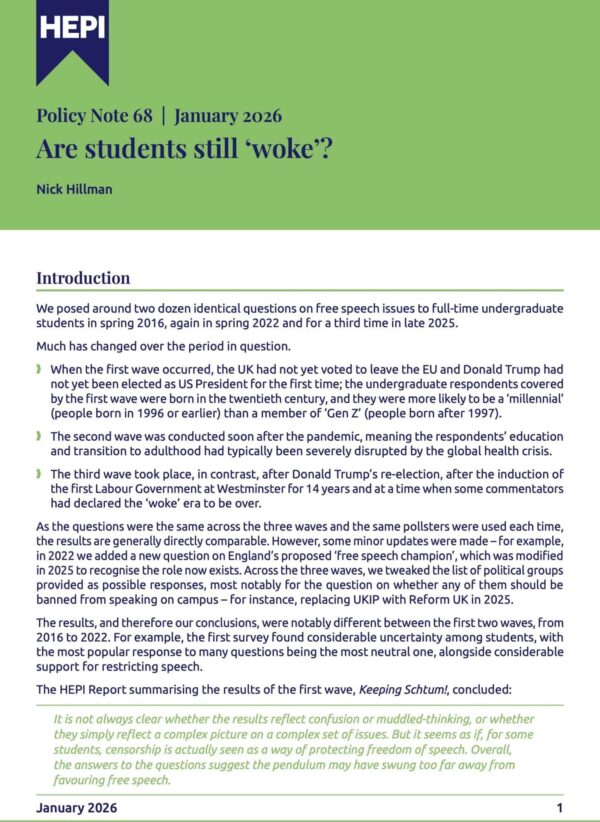How generative AI could re-shape professional services and graduate careers
Join HEPI and the University of Southampton for a webinar on Monday 10 November 2025 from 11am to 12pm to mark the launch of a new collection of essays, AI and the Future of Universities. Sign up now to hear our speakers explore the collection’s key themes and the urgent questions surrounding AI’s impact on higher education.
This blog was kindly authored by Richard Brown, Associate Fellow at the University of London’s School of Advanced Study.
Universities are on the front line of a new technological revolution. Generative AI (genAI) use (mainly large language mode-based chatbots like ChaptGPT and Claude) is almost universal among students. Plagiarism and accuracy are continuing challenges, and universities are considering how learning and assessment can respond positively to the daunting but uneven capabilities of these new technologies.
How genAI is transforming professional services
The world of work that students face after graduation is also being transformed. While it is unclear how much of the current slowdown in graduate recruitment can be attributed to current AI use, or uncertainty about its long-term impacts, it is likely that graduate careers will see great change as the technology develops. Surveys by McKinsey indicate that adoption of AI spread fastest between 2023/24 in media, communications, business, legal and professional services – the sectors with the highest proportions of graduates in their workforce (around 80 per cent in London and 60 per cent in the rest of the UK).
‘Human-centric’, a new report from the University of London looks at how AI is being adopted by professional service firms, and at what this might mean for the future shape and delivery of higher education.
The report identifies how AI is being adopted both through grassroots initiatives and corporate action. In some firms, genAI is still the preserve of ‘secret cyborgs’ – individual workers using chatbots under the radar. In others, task forces of younger workers have been deployed to find new uses for the tech to tackle chronic workflow problems or develop new services. Lawyers and accountants are codifying expertise into proprietary knowledge bases. These are private chatbots that minimise the risks of falsehood that still plague open systems, and offer potential to extend cheap professional-grade advice to many more people.
Graduate careers re-thought
What does this mean for graduate employment and skills? Many of the routine tasks frequently allocated to graduates can be automated through AI. This could be a doubled-edged sword. On the one hand, genAI may open up more varied and engaging ways for graduates to develop their skills, including the applied client-facing and problem-solving capabilities that underpin professional practice.
On the other hand, employers may question whether they need to employ as many graduates. Some of our interviewees talked of the potential for the ‘triangle’ structure of mass graduate recruitment being replaced by a ‘diamond-shaped’ refocus on mid-career hires. The obvious problem with this approach – of where mid-career hires will come from if there is no graduate recruitment – means that graduate recruitment is unlikely to dry up in the short term, but graduate careers may look very different as the knowledge economy is transformed.
The agile university in an age of career turbulence
This will have an impact on universities as well as employers. AI literacy, and the ability to use AI responsibly and authentically, are likely to become baseline expectations – suggesting that this should be core to university teaching and learning. Intriguingly, this is less about traditional computing skills and more about setting AI in context: research shows that software engineers were less in demand in early 2025 than AI ethicists and compliance specialists.
Broader ‘soft’ skills (what a previous University of London / Demos report called GRASP skills – general, relational, analytic, social and personal) will remain in demand, particularly as critical judgement, empathy and the ability to work as a team remain human-centric specialities. Employers also said that, while deep domain knowledge was still needed to assess and interrogate AI outputs, they were also looking for employees with a broader understanding of issues such as cybersecurity, climate regulation and ESG (Environmental, Social, and Governance), who could work across diverse disciplines and perspectives to create new knowledge and applications.
The shape of higher education may also need to change. Given the speed of advances in AI, it is likely that most propositions about which skills will be needed in the future may quickly become outdated (including this one). This will call for a more responsive and agile system, which can experiment with new course content and innovative teaching methods, while sustaining the rigour that underpins the value of their degrees and other qualifications.
As the Lifelong Learning Entitlement is implemented, the relationship between students and universities may also need to become more long-term, rather than an intense three-year affair. Exposure to the world of work will be important too, but this needs to be open to all, not just to those with contacts and social capital.
Longer term – beyond workplace skills?
In the longer term, all bets are off, or at least pretty risky. Public concerns (over everything from privacy, to corporate control, to disinformation, to environmental impact) and regulatory pressures may slow the adoption of AI. Or AI may so radically transform our world that workplace skills are no longer such a central concern. Previous predictions of technology unlocking a more leisured world have not been realised, but maybe this time it will be different. If so, universities will not just be preparing students for the workplace, but also helping students to prepare for, shape and flourish in a radically transformed world.






Comments
Ralph Blunden says:
You may find the LinkedIn report on AI in the workplace and also the Future of Work as useful complimentary studies in terms of global data insights on employment – see: https://economicgraph.linkedin.com/content/dam/me/economicgraph/en-us/PDF/ai-and-the-global-economy.pdf and https://learning.linkedin.com/resources/workplace-learning-report
Reply
Add comment